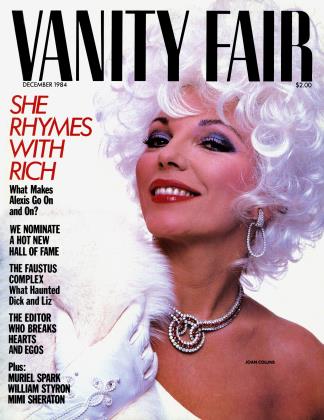Sign In to Your Account
Subscribers have complete access to the archive.
Sign In Not a Subscriber?Join NowAppearing Tonight
Sidney Lumet
BOOKS
My earliest vaudeville memories are of Milton Berle at the Loews State Theatre in Manhattan. A chorus of six Canadian Mounties is singing “StoutHearted Men.” Berle is prancing up and down limp-wristedly in front of them, hand on hip, making effeminate noises. Fairly funny. With no more transition than Henny Youngman would make between one-liners, Berle drops the fairy act and shifts gears:
Berle and chorus: Safari! Safari! Safari! Safari! Through muck, through mire.
Berle (solo): Hi ya, Muck.
Chorus of Mounties: Hi ya, Meyer.
Hilarious. I laughed at it then. I still do.
Berle was, however, closer to burlesque than to vaudeville. Burlesque was definitely vulgar. And one of the delights of American Vaudeville As Seen by Its Contemporaries, edited by Charles W. Stein (Knopf), is that it reveals how hard everyone fought for middle-class respectability. B. F. Keith, the founder of and driving force behind the enormous money-making institution that vaudeville became, has a piece reprinted in the book, entitled “The Vogue of the Vaudeville." Sounding like a nineteenth-century version of Norman Mailer’s Herman Teppis, he goes on and on about family values, “cleanliness and order," a “homelike” theater “free from vulgarisms and coarseness of any kind, so that the house and entertainment would directly appeal to the support of ladies and children.” On this philosophy the legendary Palace Theatre was built, not to mention twenty subsequent years of Twentieth Century Fox musicals. Everybody’s Magazine, Literary Digest, Billboard, and Variety, or for the author’s own autobiography.
Keith’s isn’t the only voice that Stein has included, however. The entire book, as its title states, is composed of essays and memoirs written by the people who lived and worked in vaudeville and made fortunes in it. And that is another of American Vaudeville’s pleasures. From the pretentious Norman Hapgood’s “The Life of a Vaudeville Artiste” to fascinating pieces on “The Business Side of Vaudeville,” “Browsing for Vaudeville Talent,” “Tryout Night for Aspirants to Broadway’s Favor,” “The Two-Act,” “The Wow Finish,” and “A Week of ‘One Night Stands,’” there is a wealth of firsthand detail. Mind you, it’s not nitty-gritty stuff. Many of the articles were originally written for such publications as
The most delightful parts are those written by—whom else?—the performers. Fred Astaire discusses his first New York booking (and his disastrous failure), at Proctor’s. James Cagney clearly articulates the complexities of his technique. Fanny Brice explains how technique hurt her and how she had to evolve her own style of improvisation to keep her act funny. Harry Richman starts by discussing singing but rapidly gets to his main theme: “The part that interested me most was that headline billing.” Ethel Barrymore and Alfred Lunt, two class acts, talk about their debt to vaudeville with a moving sincerity and lack of condescension. W. C. Fields, Bert Williams, Eddie Leonard, Joe E. Brown, Eddie Foy—all are wonderful and revealing. And, of course, there’s George Burns.
But Fred Allen is the one best suited to speak for the theatrical form that he watched die even as he performed in it. His acrid wit, his jaundiced wisdom, and his unfailing ability to see the large picture in a small incident are all in evidence here. Our memories of him are playing no tricks on us. His story of the oyster shucker in the audience during one of his monologues tells us all we need to know about the lunacy of reality and the bravery of artists.
If you know nothing about vaudeville, the information in this book will make for a sparkling introduction. If you know a little about it, the stories may do for you what they did for me: recall the awe I felt as I sat and watched Rudy Cardenas throw into the air—and catch—eleven cigar boxes. Or Think-aDrink Hoffman, who poured pink ladies, martinis, Manhattans, vermouth cassis, water, milk, two cents plain, and orange blossoms—all from the same cocktail shaker! How did they do it? Miracles, that’s how.
When I finished the book, I suddenly got curious about the word kootchy, as in “kootchy dancer.” Of course: from the French coucher. And the word vaudeville, which is derived from the French vaudevire, meaning popular satirical song. A book that sets your mind going in those directions is welcome indeed.
 View Full Issue
View Full Issue












Subscribers have complete access to the archive.
Sign In Not a Subscriber?Join Now